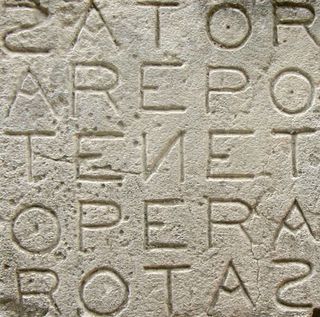Were there Christians at Pompeii? The word-square evidence.
I have had a large number of emails in the last week, asking me if there really were Christians at Pompeii. The prompt for this was Waldemar Januszczak's BBC4 programme on the Dark Ages -- which had some amazing stuff, but also claimed that there were Christians at Pompeii. The evidence for this was the scratched word square (like the one above).
It reads: "Sator/Arepo/Tenet/Opera /Rotas/" You'll see its clever "palindromic-ness" . It means (literally translated) "Arepo the sower holds the wheels at his work". But, as is often pointed out, the letters can be re-arranged into two "pater noster"s in the sign of a cross with a couple of "a"s and "o"s left over -- as in (converting to Greek) "alpha and omega". So it looks as if there could be a Christian significance: "our father" plus alpha and omega.
This "game" is found in all kind of places in the Roman world (including Cirencester) and it is often thought to be evidence of Christianity. One has been discovered in the palaestra in Pompeii ... but is it really evidence of Christianity as W J insisted in his programme? Probably not.
The whole issue has been discussed since the 1880s, but the likelihood is that this word square is originally a Jewish symbol. Certainly there are big problems in assuming that this is a Christian message pre AD 79. You can find the most sensible discussion here. But these are the basic arguments.
The idea of finding Christians in Pompeii or Herculaneum has been a holy grail for centuries. But nothing has ever proved their presence (the most famous sign of the cross appears to have been the traces left by a set of shelves).One suggestion has been that this word square with its apparently Christian message was the scratching of people who dug down into Pompeii after the eruption. That's not impossible. But much more likely is that it wasnt a Christian message at all.
The point is that -- even assuming the puzzle is to be resolved as a Pater Noster cross plus alpha and omega -- the cross does not appear (so far as we know) to have been a distinctively Christian symbol until much later than 79, and alpha and omega don't appear as Christian inscriptions until the third century AD (and that symbolism depends on apocalyptic literature later than 79). Besides, given the eastern origins of Christianity, you would expect any early Christian slogans to have been in Greek not Latin.
It is much more likely that we are dealing with a Latin-speaking Jewish slogan here, and there is plenty of evidence for Jews in the Vesuvian towns (including a kosher version of garum, the Roman staple of rotten fish sauce). "Alpha" and "omega" are well known in Jewish literature, and "our father" is perfectly compatible with a Jewish cultural background (and are found as that in Jewish prayers).
I'm afraid that ideas of Christians at Pompeii are a bit of a fantasy. Sorry.
Mary Beard's Blog
- Mary Beard's profile
- 4070 followers




